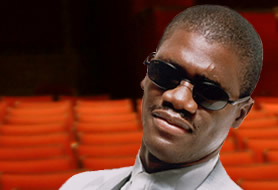Justin’s Japan: Interview with Jazz Pianist Marcus Roberts
By JQ magazine’s Justin Tedaldi (CIR Kobe-shi, 2001-02) for Examiner.com. Visit his NY Japanese Culture page here to subscribe for free alerts on newly published stories.
Blind since the age of four, at 21 years old Marcus Roberts was invited by trumpeter Wynton Marsalis to join his band in the mid-’80s, playing on such Grammy Award-winning albums as J Mood and Marsalis Standard Time, Vol. 1. Six years of touring with Marsalis followed, establishing Roberts as one of the vanguards of young American jazz pianists. Roberts formed his own trio in 1993, and since then he’s been indefatigably presenting his interpretive style around the world as a musician, recording artist and assistant professor of jazz studies at Florida State University.
This week finds the Marcus Roberts Trio, with Rodney Jordan on bass and NEA Jazz Master/Wynton’s little brother Jason Marsalis on drums, in a weeklong residency at New York’s Jazz at Lincoln Center. I spoke with Roberts about his discovery of jazz, the role of technology in his life as a musician, and his thoughts on working with legends like Marsalis and Seiji Ozawa.
What can fans expect from your upcoming shows in New York?
They can expect sort of a wide range of what we like to choose from our repertoire—we have a pretty broad repertoire. We play standard tunes of [George] Gershwin and Cole Porter; we play blues by [Thelonious] Monk and [Duke] Ellington; we play [John] Coltrane’s music; we have a lot of original music that we play; and Jelly Roll Morton. It’s going to be a little bit freer this week, you know. We’re just going to look through the book and pick kind of a historical tour of jazz, if you will.
What was your introduction to jazz?
I grew up in Jacksonville, Florida, and I first started playing piano in church. I was self taught for four years, from eight to 12, and then at 12 I was listening to the radio and I happened to hear Duke Ellington. And I just remember being really enamored with his touch; his style; the chords he was playing. And it went from there; I went from Duke to Louis Armstrong and then I ventured to Miles Davis and Coltrane and Monk, and one by one as the years went on, I got more deep in being interested in how these guys were playing all this stuff that they were coming up with, and how I could emulate that.
Who was your first love in music?
Probably Duke Ellington; I think my real first interest was him. And also [jazz pianists] Teddy Wilson and Mary Lou Williams—I remember hearing Mary Lou Williams with Benny Goodman, and that always struck me. I guess when I’m listening to a great jazz artist, what I’m really always looking for is something that can be taken even outside of the context that they put it in, and I’m able to personalize it and identify my own personality and identity within it. So, honestly, there are many great artists that I love.
Growing up, how did you come to learn about Japan?
I don’t know—I think the first time I went to Japan was with Wynton in 1987, and then I believe went again with a quartet in ’89. But my most memorable experiences of going to Japan have always been with the great conductor Seiji Ozawa. He invited me there a couple of times, and we’ve done Gershwin’s Concerto in F there a few times. It’s probably one of the highlights of my career, going there, doing that with him, because he’s such an innovator, such a great man, and he’s always been very interested in the relationship between how jazz and classical music can be collaborated together, and we always enjoyed working with him there in Japan.
What was it like performing with the maestro?
Oh, my God, absolutely incredible—he is just amazing. He knows that score inside and out, and his dedication to just greatness in general, he’s very infectious. And my band and the other musicians always knew that it was going to be a great performance, because he just wasn’t going to have it any other way. If he had the schedule for rehearsals, I’d talk to him, and by the time we got going, he’d been up since four o’clock in the morning studying scores, making sure that everything was going to be all right. So, he taught me a lot about how you put things on the stage and how you continue to push yourself to reach a real level of expertise and communication with an audience.
Do you enjoy traveling? Where are some of your favorite places around the world?
I enjoy traveling; it’s always fun. It’s always a blessing to be able to play to people and hopefully inspire them through the music you play to have a better day or just something they might be going through. For me, I pretty much will go anywhere, but I love Italy because of the food there, you know? I like going to New Orleans because of the food—I like a lot of places, but I can’t single out a whole bunch of them. I think it’s more about just the variety of the different cultures and the places you can go, because all those different localities have different things that they bring to you, and I guess, from my perspective, since every year we’re going to different places, I guess I’m more intrigued with the act of traveling itself, wherever it is. I also like France for the desserts, and Japan for the sushi. [Laughs]
Click here for the rest of the interview.



Comments are closed.